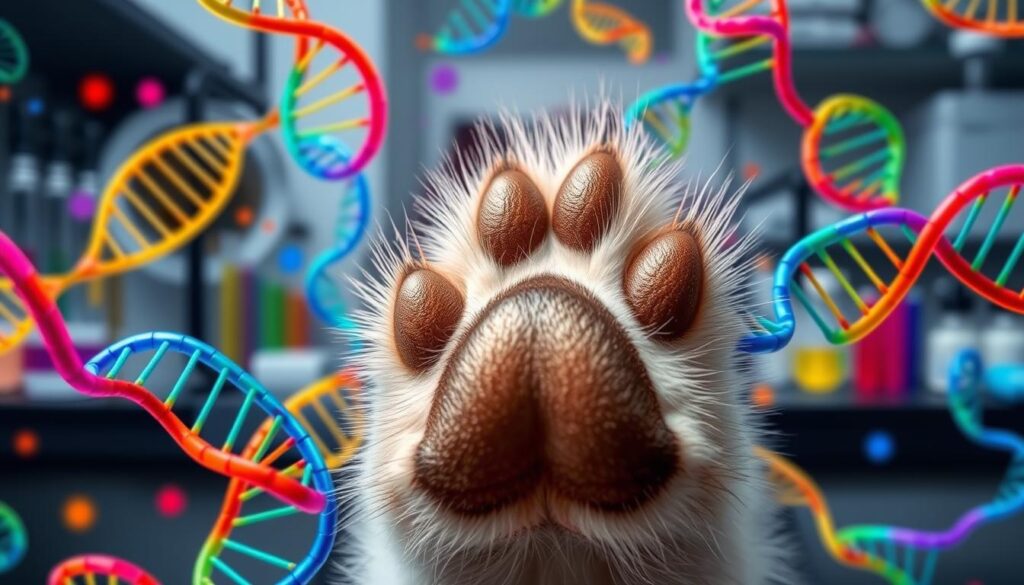A Dog DNA Test is a game-changer for pet owners. It reveals your dog’s genetic makeup, including their breed, ancestry, and health. This knowledge helps owners understand their dog’s traits and health risks better. It lets them create a care plan that fits their dog’s needs, improving their health and happiness.
Using dog breed analysis, owners can learn what makes their dog special. This info helps in training, feeding, and healthcare. A Dog DNA Test is easy and painless. It involves taking a DNA sample, which is then analyzed to give a detailed report on your dog’s genetics.
Canine genetic testing helps owners be proactive about their dog’s health. It can spot genetic disorders early, helping to prevent or manage them. This not only makes your dog’s life better but also strengthens your bond. Whether you’re a seasoned dog owner or new to the scene, a Dog DNA Test is a must-have for the best care of your furry friend.
Key Takeaways
- Understanding your dog’s genetic makeup through a Dog DNA Test can improve their care and well-being.
- Canine genetic testing provides valuable insights into a dog’s breed, ancestry, and health.
- Dog breed analysis can inform training, nutrition, and healthcare decisions.
- A Dog DNA Test is a simple and non-invasive process.
- Genetic testing can help identify potential genetic disorders and improve a dog’s quality of life.
- By utilizing a Dog DNA Test, owners can take a proactive approach to their dog’s health and strengthen their bond with their pet.
Understanding Dog DNA Testing Basics
Dog DNA testing is a field that’s become more popular. It lets dog owners learn about their pet’s genetic makeup. They can find out about their ancestry and health.
A DNA test for dogs works by taking a DNA sample from the dog’s cheek or blood. This sample goes to a lab for analysis. There, scientists compare it to a database of known breeds.
What is Canine Genetic Testing?
Canine genetic testing analyzes a dog’s DNA. It finds out the dog’s breed, ancestry, and health risks. This info helps with breeding, health issues, and caring for the dog.
How DNA Testing Works for Dogs
The DNA testing process for dogs is easy. Owners buy a dog ancestry test kit. It has a cheek swab or blood device. After sending the sample to a lab, results come back in a few weeks.
The Science Behind Breed Identification
The science of breed identification is complex. It compares the dog’s DNA to a database of breeds. This database keeps getting updated. It makes breed identification and ancestry analysis more accurate.
Why Pet Parents Choose Genetic Testing
Genetic health screening for dogs is getting more popular. It lets pet parents see their dog’s genetic makeup. This helps spot health issues early, before they get worse. By testing, pet parents can plan care that fits their dog’s needs.
Here are some reasons pet parents pick genetic testing:
- It finds genetic disorders early, so they can get treated fast
- It helps make care plans that match a dog’s genetic profile
- It gives a better understanding of a dog’s ancestry and breed traits
- It helps make smart choices about breeding and reproduction
Genetic testing is also key for responsible breeding. It helps breeders avoid passing on health problems. This makes dogs healthier and better for the breed overall.
Genetic health screening and testing are great tools for pet parents and breeders. They give insights into a dog’s genetics. This improves their health, happiness, and life quality.
The Benefits of Dog DNA Tests
Discovering a dog’s genetic makeup is fascinating and rewarding for pet owners. A Dog DNA Test offers insights into a dog’s ancestry, health, and behavior. This helps owners make better decisions for their pet’s care. It also reveals a dog’s breed composition and potential health risks.
Some key benefits of dog DNA testing include:
- Ancestry discovery: uncovering a dog’s breed heritage and genetic history
- Health screening benefits: identifying potential health risks and taking preventive measures
- Behavior understanding: understanding a dog’s behavior and personality traits
- Personalized care planning: developing a tailored care plan based on a dog’s unique needs and characteristics
Pet owners can take a proactive approach to their dog’s health with dog breed analysis and genetic testing. A Dog DNA Test is a valuable tool for ensuring a dog’s happiness and health.
Popular Dog DNA Test Options Available Today
There are many dog DNA test options for owners. These tests reveal a dog’s breed, ancestry, and health risks. Some top choices include:
- Embark Veterinary
- Wisdom Panel
- DNA My Dog
These tests show a dog’s breed mix, health risks, and ancestry. Choosing a trusted company helps owners understand their dog’s genetics. This knowledge aids in making better health choices for their pets.
It’s key to compare different dog DNA tests. Look at cost, accuracy, and the info they offer. The right test can reveal your dog’s genetic secrets. This knowledge helps in caring for their health more effectively.

What to Expect from Your Dog DNA Test Kit
When you buy a dog DNA test kit, you get a full package. It has everything you need to take a sample from your dog. Then, you send it to the lab for analysis. This kit helps you understand your dog’s ancestry and health through a dog ancestry test and genetic health screening for dogs.
The first step is to collect a sample. This can be a cheek swab or blood. After that, the lab analyzes it for genetic markers.
Testing Timeline
The whole process usually takes a few weeks. The lab works on the sample, creating a report. This report will tell you about your dog’s ancestry and health.
When the report is ready, you’ll get a detailed look at your dog’s ancestry, health, and traits. The
Results Interpretation
can seem complex. But, most labs make it easy to understand. They offer a simple way to grasp the results and their impact on your dog’s health.
Using a dog DNA test kit helps you understand your dog better. It’s great for a dog ancestry test or genetic health screening for dogs. It gives you the info you need to keep your dog happy and healthy.
Understanding Your Dog’s Ancestry Results
Getting the results of a Dog DNA Test is exciting. You’ll learn about your dog’s ancestry. This info helps understand their behavior and health. Canine genetic testing also spots health issues linked to their breed or ancestry.
To get the most from your dog’s ancestry results, it’s key to understand them. You’ll see a breakdown of their breed mix and ancestors. This knowledge helps you care for your dog better.
When looking at your dog’s ancestry results, keep an eye out for:
- Breed composition: This shows what breeds are in your dog’s ancestry.
- Ancestry information: It tells you about your dog’s ancestors, including their breed and where they’re from.
- Health information: This might list health issues linked to their breed or ancestry.
Understanding your dog’s ancestry results deepens your appreciation for them. Whether you’re new to dog ownership or not, a Dog DNA Test is helpful. Canine genetic testing aids in making better care and health choices for your dog. This ensures they live a happy, healthy life.
Genetic Health Screening Insights
Genetic testing for dogs gives pet owners a peek into their dog’s genetic makeup. This helps them make smart choices about their dog’s health. It’s key to spotting health risks early and creating care plans just for them.
Genetic testing lets owners understand their dog’s genetic risks. They can then take steps to prevent or manage health problems. Preventive care is a big plus, helping owners and vets create care plans that fit.
Common Health Markers
Genetic screening can find common health markers in dogs. These markers are linked to certain breeds or health issues. Knowing about these markers helps owners lower their dog’s risk of health problems.
Preventive Care Opportunities
Genetic testing opens doors for preventive care. Owners can take early steps to protect their dog’s health. This might mean changing their diet, adjusting exercise, or regular vet visits.
- Identifying genetic predispositions to certain health conditions
- Developing personalized care plans to manage or prevent health issues
- Enhancing the overall health and well-being of the dog
By using genetic health screening, owners can make better health choices for their dogs. They can take steps to keep their dogs healthy and happy.
How Accurate Are Dog DNA Tests?
The accuracy of Dog DNA Test kits is a big worry for many pet owners. Several things can change how accurate these tests are. These include the DNA sample quality, the testing method, and the lab’s expertise.
When picking a Dog DNA Test, it’s key to choose a trusted company. They should use top-notch testing methods and have skilled people to read the results. Canine genetic testing can tell us a lot about a dog’s background, health, and behavior. But, how accurate the results are depends on many things.
Some things that can mess with the accuracy of Dog DNA Tests are:
- Quality of the DNA sample
- Testing methodology
- Expertise of the laboratory

Knowing what can mess with the accuracy of these tests helps pet owners make better choices. It’s important to pick a reliable company. This way, pet owners can really understand their dog’s genetic makeup. They can then make smart choices about their dog’s health and happiness.
Cost Considerations and Value Analysis
Cost is a big deal when it comes to pet DNA testing. The price for a dog DNA test can change a lot. On average, a basic test costs between $50 and $100. More detailed tests can go up to $200 or more.
Price Range Comparison
Here are some things to think about when looking at prices:
- Type of test: Basic tests just tell you the breed. More detailed tests check health and genetic traits.
- Company reputation: Known companies might cost more. But they usually give better and more accurate results.
- Sample collection method: Some tests need a blood sample. Others just need a cheek swab.
Investment Benefits
Even though pet DNA testing can be pricey, it’s worth it for your dog’s health. It can help find health problems early. This can save you money later on.
Also, many pet insurance companies give discounts if your dog has had DNA testing.
Making the Most of Your Test Results
After getting your dog’s genetic test results, it’s key to know how to use this info. Genetic health screening for dogs gives insights into health issues. This lets you take steps to keep your pet healthy. Talk to a vet to create a care plan just for your dog.
Important things to think about with your test results include:
- Identifying potential health risks and taking preventive measures
- Developing a customized diet and exercise plan to support your dog’s overall health
- Staying informed about the latest research and advancements in genetic testing for canines
Using genetic health screening info helps you care for your pet better. It makes their life better and strengthens your bond with them.
Common Misconceptions About Canine Genetic Testing
There are many myths about canine genetic testing. A Dog DNA Test can help understand a dog’s genetics. But, it’s key to know what’s true and what’s not.
Accuracy Myths
Some think Dog DNA Tests aren’t accurate. But, top companies use the latest tech for precise results. It’s vital to pick a trusted company for your canine genetic testing.
Result Interpretation Errors
Many believe Dog DNA Test results are simple. But, they can be complex and need a genetic expert. Always get a vet or genetic expert to explain the results.
Testing Limitations
Canine genetic testing has its limits. A Dog DNA Test can spot some traits and health issues. But, it’s not a full health check. It should be part of a bigger health plan.
Working with Your Vet After DNA Testing
After getting your pet’s DNA test results, it’s key to talk to your vet. They can help you understand what the test means for your dog. This test can tell you about your dog’s breed and health risks.
Your vet can explain the DNA test results and point out health concerns. They’ll help you plan how to keep your dog healthy. This might include regular check-ups and preventive care like shots and flea control.
Some important things to talk about with your vet include:
- Understanding your dog’s breed ancestry and how it may impact their health
- Identifying potential health risks and developing a plan to manage them
- Creating a personalized care plan that takes into account your dog’s unique needs and health status
By working with your vet and using your pet’s DNA test results, you can give your dog the best care. This way, they can live a long, healthy life. 
Privacy and Data Protection in Pet DNA Testing
Pet owners want to keep their dog’s personal info safe. Genetic testing for dogs involves collecting and analyzing DNA. This raises questions about how data is stored and shared.
It’s important to pick a trusted testing company. They should care about keeping your dog’s data safe and be open about it.
Some things to think about include how your dog’s genetic info will be used and who will see it. Good companies will tell you how they handle data. They should also respect your rights to your dog’s genetic info.
To keep your dog’s genetic health screening safe, you can do a few things:
- Look into the company’s data protection policies
- Find out how they use and share your dog’s genetic info
- Pick a company that values transparency and data safety
By doing these things, you can protect your dog’s sensitive info. This way, genetic testing for dogs is used in a responsible way.
Impact on Breeding and Adoption Decisions
A Dog DNA Test can greatly affect breeding and adoption choices. It helps make better decisions about a dog’s health and well-being. This is thanks to understanding a dog’s genetic makeup through testing.
Responsible Breeding Practices
Responsible breeding means using Dog DNA Test results to spot health issues. Breeders can then breed dogs that are less likely to have genetic disorders. This reduces inherited diseases and improves the breed’s health.
Adoption Insights
A Dog DNA Test gives adopters insights into a dog’s ancestry. It helps identify health issues and informs care decisions. It also helps understand a dog’s behavior and personality, leading to a better relationship.
Future Planning
Using Dog DNA Test results helps plan for the future. Breeders and adopters can make informed decisions about breeding, training, and care. It identifies health issues early, leading to better care and a better life for dogs.
How DNA Testing is Shaping the Future of Pet Care
Pet DNA testing is changing how we care for our pets. It lets owners understand their pet’s genetics, leading to better care plans. This new approach is making the pet care industry better, helping owners make smart health choices for their pets.
Emerging Technologies
New tech is making pet DNA testing faster, cheaper, and more accurate. It lets owners get lots of genetic info, from breed to health. The main new tech includes:
- Next-generation sequencing
- Genetic marker identification
- Artificial intelligence-powered analysis
These advancements are making pet DNA testing more reliable. They also open up new ways to care for pets, helping owners make better choices.
Research Applications
Scientists are using pet DNA testing for many studies. They look at health and behavior to find new treatments. This research could make dogs and their owners healthier and happier.
Taking the Next Step in Understanding Your Furry Friend
Now that you’ve explored the fascinating world of genetic testing for dogs, it’s time to take the next step. The insights from genetic health screening for dogs and genetic testing for canines should guide a personalized care plan. Work with your veterinarian to create this plan.
Regular check-ups and preventive care are key to your dog’s health. By teaming up with your vet, you can tackle any health issues early. This way, you ensure your dog gets the best care, suited to their genetic makeup.
Genetic testing is a powerful tool, but it needs vet guidance. Keep nurturing your bond with your dog by staying informed and dedicated to their health. Together, you can understand and care for your pet better.
FAQ
What is Canine Genetic Testing?
Canine genetic testing is a way to check a dog’s DNA. It shows their breed, health risks, and other traits. This helps understand a dog’s health and happiness.
How Does DNA Testing Work for Dogs?
DNA testing for dogs involves a simple cheek swab or blood draw. The sample goes to a lab for analysis. There, it’s compared to breed profiles to reveal the dog’s ancestry and health risks.
What is the Science Behind Breed Identification?
Breed identification uses genetic markers unique to each breed. By analyzing these markers, scientists can accurately determine a dog’s breed. This method is very accurate.
Why Do Pet Parents Choose Genetic Testing for Their Dogs?
Pet parents choose genetic testing for many reasons. It helps identify breed ancestry, screens for health issues, and understands behavior. It also helps plan personalized care for their dogs.
What Are the Benefits of Dog DNA Tests?
Dog DNA tests offer many benefits. They reveal ancestry, screen for health, understand behavior, and plan care. These tests help pet owners make informed decisions about their dog’s health.
What Are Some Popular Dog DNA Test Options Available Today?
Popular dog DNA tests include Embark, Wisdom Panel, and AncestryDNA for Pets. These tests analyze breed, health, and ancestry. Each has unique features and costs, so it’s important to compare them.
What Can I Expect from a Dog DNA Test Kit?
Expect a simple sample collection with a cheek swab or blood draw. Results usually come in a few weeks. Then, you’ll learn about your dog’s ancestry, health, and other genetic traits.
How Accurate Are Dog DNA Tests?
Dog DNA test accuracy depends on the company and their database. Reputable companies with advanced analysis and large databases offer accurate results. Always choose a reliable provider for the best results.
What Are the Cost Considerations and Value Analysis of Dog DNA Tests?
Dog DNA tests cost between to 0 or more. The initial cost is worth it for early health detection and personalized care. Some pet insurance may also cover or discount the cost, adding value.
What Are Some Common Misconceptions About Canine Genetic Testing?
Some think DNA tests are always accurate or that they can solve all health issues. But, they’re not perfect. Always interpret results with a vet’s help and choose a trusted provider.
How Can I Work with My Vet After DNA Testing?
After DNA testing, work closely with your vet. They’ll help understand the results and plan care. Regular check-ups and communication are key to your dog’s health.
What Privacy and Data Protection Considerations Are Involved in Pet DNA Testing?
Pet DNA testing raises privacy and data concerns. Choose a reputable company with strong data security. Know how your dog’s data will be used and protected.
How Can Dog DNA Testing Impact Breeding and Adoption Decisions?
DNA testing affects breeding and adoption. It helps breeders identify health risks and plan healthier litters. For adopters, it provides insights into a dog’s breed, health, and temperament, ensuring a good match.
How is DNA Testing Shaping the Future of Pet Care?
DNA testing is changing pet care with new research and technologies. It’s leading to personalized care plans and new genetic discoveries. Expect more innovations in pet health as genetics evolve.
What Are the Next Steps in Understanding My Furry Friend’s Genetic Makeup?
To understand your dog’s genetics, consult your vet. They’ll interpret DNA test results, identify health risks, and plan care. Regular vet visits and communication are essential for your dog’s health.

